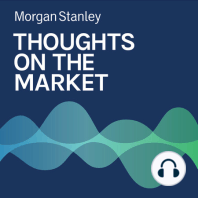3 min listen

Michael Zezas: A False Choice for Energy Policy
Michael Zezas: A False Choice for Energy Policy
ratings:
Length:
2 minutes
Released:
Mar 16, 2022
Format:
Podcast episode
Description
As oil prices rise across the globe, investors wonder if governments will continue to incentivize clean energy development or pivot to greater investment in traditional fossil fuels.-----Transcript-----Welcome to Thoughts on the Market. I'm Michael Zezas, Head of Public Policy Research and Municipal Strategy for Morgan Stanley. Along with my colleagues bringing you a variety of perspectives, I'll be talking about the intersection between U.S. public policy and financial markets. It's Wednesday, March 16th, at 10:00 a.m. in New York. With the conflict in Ukraine ongoing, many investors continue to ask questions about the U.S. and European policy response to the rising price of oil. In particular, many ask if governments will continue down the path of incentivizing clean energy development, or pivot to greater exploration of traditional fossil fuels. But as my colleague Stephen Byrd, who heads North America Power Utilities and Clean Energy Research, pointed out in a recent report, this is a false choice, and it's one that many policymakers are likely to reject in favor of embracing an "all of the above" strategy. It's important to understand that focusing only on traditional energy sources wouldn't solve the problem in the near term. For example, switching on any dormant U.S. oil production facilities would only replace a fraction of the oil that Russia produces, so fresh explorations ramp up production would be needed, and that could take a few years. The same could be said about natural gas. The U.S. Has the spare capacity to backfill with Europe imports from Russia, but Europe mostly doesn't have the facilities to accept liquefied natural gas shipped overseas from America. Germany has announced plans to build two liquefied natural gas terminals, but that could take years to complete. The point is, focusing on traditional energy sources alone is no quick fix for high energy prices and energy independence, and therefore there's little opportunity cost in also focusing on renewable energy development. For that reason, we think western governments are likely to include both clean energy and traditional investments in their strategy going forward. You see this echoed in the statements of policymakers, such as U.S. Climate Envoy John Kerry's recent comments that the US is committed to an "all of the above" energy policy. So what does it mean for investors? In short, expect energy companies of all types to have business to do with governments in the coming years. That includes traditional oil exploration companies, but also clean tech companies, as market beneficiaries. Thanks for listening. If you enjoy the show, please share Thoughts on the Market with a friend or colleague, or leave us a review on Apple Podcasts. It helps more people find the show.
Released:
Mar 16, 2022
Format:
Podcast episode
Titles in the series (100)
Andrew Sheets: For Markets, Signs, Signs, Everywhere Signs by Thoughts on the Market